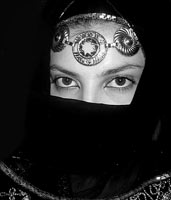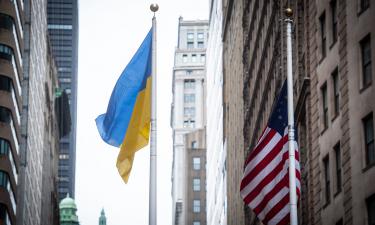Saudi women trying to break down more barriers
A minor revolution has spread to this sprawling oil town, where six women are running this week for seats on the local chamber of commerce. "We're setting an example. Women and men can do things together," said candidate Samia Al-Edrisi, an energetic 55-year-old wearing a jeans jacket under a black abaya, a pair of stiletto-heels poking from under the cloak. "It's a very exciting time to be a Saudi woman."

While the election may seem insignificant in a global context, it's a marker of progress in this deeply conservative country, where Islam dictates strict segregation of the sexes, where progress toward a more open political system, including greater rights for women, is measured in inches, not miles. Al-Edrisi and her colleagues in the Eastern Province, home to the world's richest oil fields, are not the first, But they have climbed aboard a very small bandwagon. In an unprecedented November chamber of commerce election in Jiddah, Saudi Arabia's second-largest city, of a pair of businesswomen became Saudi Arabia's first female elected officials.
Al-Edrisi and her abaya-clad running mates, one of whom wears a veil covering her face, are competing with 40 men for 12 seats on the Chamber of Commerce and Industry board after being barred from public life for most of their lives, .
Minister of Commerce and Economy Hashem Yamani will appoint six other members. Voting started Saturday, and results are expected Thursday. The chamber board has no political authority and serves only an advisory role in economic decisions.
Women are still banned from running or voting in municipal government elections, Saudi Arabia's first democratic experiment, which started last year. Electoral officials have said women might gain the right to cast ballots in political elections in 2009.
Saudi women lack many rights taken for granted in most of the rest of the world. They aren't allowed to drive or work in the same offices as men. Their ownership of businesses has, until recently, been restricted to ventures like hair salons, boutiques and spas.
Even the Chamber of Commerce building, a shiny glass-and-concrete tower along the Dammam highway, is off-limits to women during working hours. But that's changing.
"It's going to be hard for them," candidate Suad Al-Zaydi, an interior designer, said of the chamber's male board members. "They've been sitting alone, just men, for all these years. They won't be able to speak their minds anymore. They'll have to understand there are women in the room."
King Abdullah, who took the throne in August after the death of his half brother Fahd, has spoken in favor of a larger role for women. And the six women candidates credited Abdullah's personal intervention for their opportunity to run. Al-Edrisi, a clothing importer, says the kingdom's future depends on women joining public life. But she also believes Saudis won't tolerate rapid change, noting the chaos in Iraq after U.S. forces ousted Saddam Hussein.
"Iraq is horrifying for all of us," Al-Edrisi said. "We don't want upheaval no matter how much we want democracy. Stability is not overrated, especially in the Middle East." But pressure for change is everywhere, including from the Bush administration, which Al-Edrisi says harms their cause by identifying it with America.
There's motivation aplenty from within, from educated Saudi women who might chose to leave, Al-Edrisi said, if denied meaningful careers. She cited her two college-educated daughters, whom, she said, wouldn't stay in Saudi Arabia if reform is too slow.
"It's a global economy now. They'll seek opportunities wherever they are," she said, gesturing with her mobile phone. Saudi attitudes on women appear to be ahead of government policy. Working women were once viewed as headstrong and had trouble finding husbands. Now, the women said, a career helps attract a husband, reports the AP.
N.U.
Subscribe to Pravda.Ru Telegram channel, Facebook, RSS!





